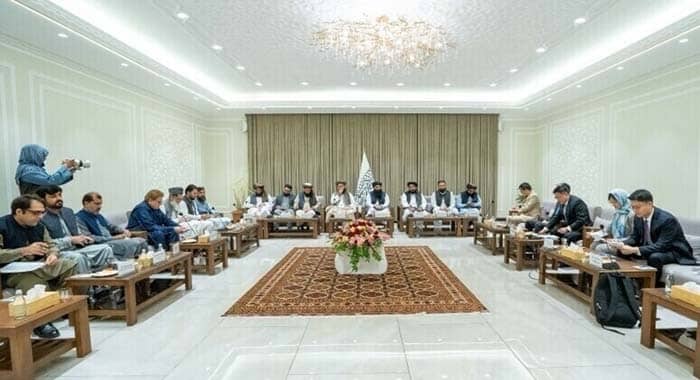Chinese Foreign Minister Wang Yi will arrive in Islamabad on Thursday (tomorrow) to co-chair the sixth Pakistan-China Foreign Ministers’ Strategic Dialogue, while on Wednesday, Kabul is hosting a trilateral meeting of the foreign ministers of China, Pakistan, and the Taliban administration to discuss counterterrorism and regional cooperation.
The Afghan Ministry of Foreign Affairs announced on Tuesday that Wang Yi, who is also a member of the Political Bureau of the Communist Party of China, along with Pakistan’s Deputy Prime Minister and Foreign Minister Ishaq Dar, will visit Kabul on August 20 to participate in the trilateral dialogue.
The talks are expected to review progress on earlier commitments, including enhanced counterterrorism cooperation, extension of the China-Pakistan Economic Corridor (CPEC) into Afghanistan, and initiatives to bolster regional trade and connectivity. The Afghan foreign ministry stated that the meeting will provide an opportunity for all sides to exchange views on the future of relations “on the basis of mutual interests, understanding, and broad cooperation.”
This will be the first such dialogue hosted in Afghanistan since the Taliban seized power in Kabul in August 2021. The one-day meeting will bring together Wang Yi, Ishaq Dar, and the Taliban’s acting foreign minister, Amir Khan Muttaqi.
Sources familiar with the matter told Amu TV that Pakistan’s Foreign Minister has accepted the Taliban’s invitation and will be accompanied by Pakistan’s special envoy for Afghanistan, Mohammad Sadiq. Pakistani outlet The Nation also reported that the Taliban invited both China and Pakistan to the Kabul talks, with security and economic cooperation high on the agenda.
The previous round of trilateral discussions took place in China in May, after which Islamabad announced its decision to upgrade diplomatic relations with the Taliban to ambassadorial level. Wednesday’s meeting is expected to build on that process, with a focus on counterterrorism collaboration, regional connectivity, trade, peace, and development.
Regional observers note that China has so far taken a cautious approach in engaging with the Taliban, preferring multilateral formats that include Pakistan and other stakeholders while avoiding outright recognition of the Taliban government. “This formal meeting of the foreign ministers in Kabul reflects China’s concern over regional security dynamics,” said Sarah Godek, a fellow with the Stimson Center’s China program. “When Pakistan-Taliban relations deteriorate due to cross-border attacks, it threatens not only regional stability but also China’s strategic and security interests. That has been a major impetus behind this trilateral engagement.”
Speaking at the same forum, Amna Khan, Director of the Afghanistan, Middle East and Africa programme at the Institute of Strategic Studies Islamabad, stressed the importance of holding the Taliban accountable for their commitments under the 2020 Doha Agreement. “The Taliban have been the only group to benefit from the Doha Agreement,” she argued. “It is time to press them on pledges related to women’s rights, human rights, inclusive governance, reconciliation, and above all, counterterrorism assurances, which continue to affect Pakistan and the wider region.”
It has been four years since the Taliban regained power, yet despite growing regional engagement, only Russia has formally recognized their government. The Taliban have not issued any public statement on the upcoming trilateral meeting in Kabul.





